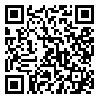Wed, Feb 18, 2026
[Archive]
Volume 39, Issue 1 (1-2025)
Med J Islam Repub Iran 2025 |
Back to browse issues page
Download citation:
BibTeX | RIS | EndNote | Medlars | ProCite | Reference Manager | RefWorks
Send citation to:



BibTeX | RIS | EndNote | Medlars | ProCite | Reference Manager | RefWorks
Send citation to:
Abaeian G, Soltani M, Moradi N, Rahimifar P, Hesam S. Measuring Quality of Life in the Speakers with Dysarthria: Reliability and Validity of the Persian Version of the Qol-Dys. Med J Islam Repub Iran 2025; 39 (1) :1242-1252
URL: http://mjiri.iums.ac.ir/article-1-9785-en.html
URL: http://mjiri.iums.ac.ir/article-1-9785-en.html
Speech Therapy Department, Rehabilitation Research Center, Ahvaz Jundishapur University of Medical Sciences, Ahvaz, Iran , majidsoltanist@gmail.com
Abstract: (214 Views)
Background: In light of the significance of quality of life in clinical decision-making for patients with dysarthria and the absence of a reliable Persian questionnaire in this field, the objective of the present study was to determine the validity and reliability of the Persian version of the Quality of Life Questionnaire in those diagnosed with dysarthria (QoL-DyS questionnaire), thereby providing a clinically applicable measurement tool.
Methods: The original research involved 70 patients diagnosed with dysarthria, comprising 26 females and 44 males, as well as 70 healthy participants matched to the patient group. After translating the Cultural and Linguistic Adaptation of the QoL-DyS questionnaire into Persian, internal consistency was calculated using Cronbach's alpha coefficient. At the same time, the reliability of the test-retest was evaluated using the intraclass correlation coefficient (ICC). Additionally, the questionnaire's content validity, clinical validity, and criterion validity were calculated.
Results: The questionnaire and all subcategories demonstrated a Cronbach's alpha coefficient exceeding 0.70, and the reproducibility coefficient (ICC) was found to be 0.96 [95% CI, 0.94-0.98]. The content validity ratio (CVR) for all questionnaire items ranged from 0.7 to 1, while the content validity index (CVI) for all items fell between 0.8 and 1. In clinical validity, a significant difference emerged between the mean scores of the patient group and those of the healthy controls (P < 0.000). The criterion validity analysis revealed a satisfactory correlation (r = 0.874, P < 0.000) between the QoL-DyS questionnaire and the Voice Handicap Index questionnaire.
Conclusion: The Persian adaptation of the QoL-DyS questionnaire demonstrates strong validity and reliability. This finding highlights the instrument’s suitability for use by speech-language therapists in evaluating the quality of life of patients experiencing dysarthria.
Methods: The original research involved 70 patients diagnosed with dysarthria, comprising 26 females and 44 males, as well as 70 healthy participants matched to the patient group. After translating the Cultural and Linguistic Adaptation of the QoL-DyS questionnaire into Persian, internal consistency was calculated using Cronbach's alpha coefficient. At the same time, the reliability of the test-retest was evaluated using the intraclass correlation coefficient (ICC). Additionally, the questionnaire's content validity, clinical validity, and criterion validity were calculated.
Results: The questionnaire and all subcategories demonstrated a Cronbach's alpha coefficient exceeding 0.70, and the reproducibility coefficient (ICC) was found to be 0.96 [95% CI, 0.94-0.98]. The content validity ratio (CVR) for all questionnaire items ranged from 0.7 to 1, while the content validity index (CVI) for all items fell between 0.8 and 1. In clinical validity, a significant difference emerged between the mean scores of the patient group and those of the healthy controls (P < 0.000). The criterion validity analysis revealed a satisfactory correlation (r = 0.874, P < 0.000) between the QoL-DyS questionnaire and the Voice Handicap Index questionnaire.
Conclusion: The Persian adaptation of the QoL-DyS questionnaire demonstrates strong validity and reliability. This finding highlights the instrument’s suitability for use by speech-language therapists in evaluating the quality of life of patients experiencing dysarthria.
Type of Study: Original Research |
Subject:
Speech and Language Therapist
Send email to the article author
| Rights and permissions | |
 |
This work is licensed under a Creative Commons Attribution-NonCommercial 4.0 International License. |








